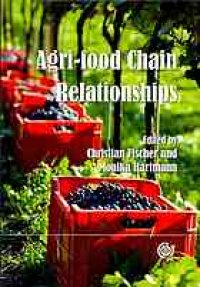- Year: 2010
- Publisher: CABI
- City: Wallingford, Oxfordshire, UK ; Cambridge, MA
- Language: English
-
pdf
This book is the result of several years of research activity on the topic of how to better link farmers, processors and retailers with each other in order to ensure and improve the supply of food products which meet consumer needs and wants. The book is structured in three parts. Starting with an overview regarding main developments in the agri-food sector with relevance for chain relationships (chapter 1), Part I is mainly concerned with providing the theoretical foundations for analysing agrifood chain relations (chapters 2, 3 and 4). Building on this conceptual basis, the second part presents in-depth empirical evidence for different countries, food chains and chain stages regarding the issues of trust and sustainable relationships in agri-food chains (chapters 5 to 14). The red meat industry (beef and pigmeat) is the focus of chapters 5, 7 and 9. Cereals (bread and malting barley) are analysed in chapters 5, 7, 8, 10 and 13. Horticultural products (fresh produce and wine) are investigated in chapters 6, 12 and 14. Regionally, the studies cover Europe, North America (the USA), China, Australia and the Philippines. While most studies were conducted in developed markets, chapters 6 and 12 look at the particularities of transition or developing economies. As to individual agri-food chain stakeholders, a number of chapters (chapters 5 to 12, 14 and 15) offer and discuss separate findings for farmers, food processors or retailers. Based on the theoretical and empirical findings in the first two parts of the book, recommendations for agribusiness managers (chapter 15) and policy-makers (chapter 16) are described in the third part. Chapter 17 discusses avenues for future research. Read more...
